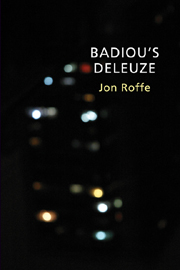4 - The virtual
Summary
The heart of Badiou's reading of Deleuze is found in his reconstruction and critique of Deleuze's virtual–actual distinction. Indeed, the assertion that “‘Virtual’ is without any doubt the principal name of Being in Deleuze's work” (DCB 43/65) makes clear an important touchstone of Badiou's reading, namely, that while he thinks that Deleuze's philosophy unfolds by way of a series of hierarchical pairs, these pairs are organized hierarchically. As a result, it is no surprise to find numerous repetitions of the claims about the virtual–actual distinction throughout The Clamor of Being, even when it is not this distinction as such that is at issue.
There is no doubt that the concept of the virtual is an important concept in Deleuze. Should we try to offer a preliminary definition of the virtual, however, we find ourselves within a thicket of problems, one of which seems particularly pressing. The term “virtual” can be found at numerous points in Deleuze's work, beginning with the early texts on Bergson in the 1950s, through Difference and Repetition, and up to and including his final article “Immanence: A Life …” Between these various presentations of the virtual, however, there are diplacements in the sense of the term, its precise role in the given text and the conceptual terrain within which it is located. In some cases, these displacements seem minor, but in others the differences are striking and even puzzling.
- Type
- Chapter
- Information
- Badiou's Deleuze , pp. 43 - 79Publisher: Acumen PublishingPrint publication year: 2011



